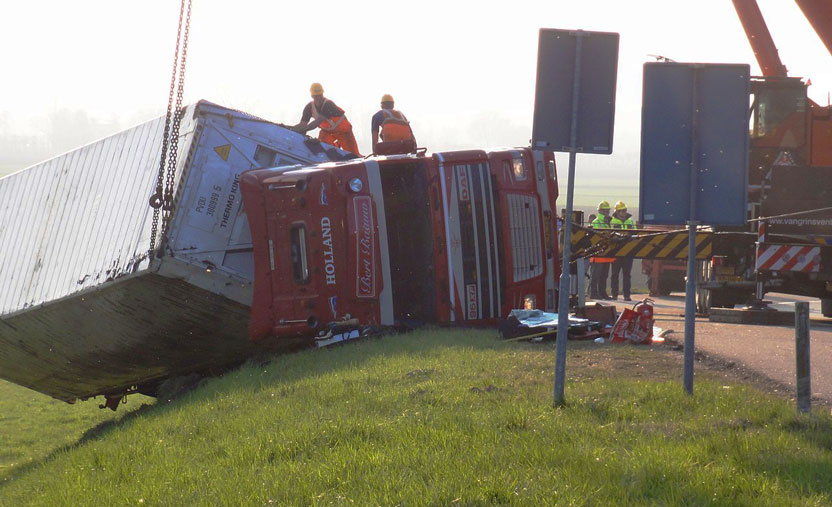Testing for Sleep Apnea Falls on Trucking Companies
The Federal Railroad Administration (FRA) and the Federal Motor Carrier Safety Administration (FMCSA) planned to make a rule regarding sleep apnea in March 2016. However, that notice of proposed rulemaking (NPRM) was quietly withdrawn in August 2017, leaving sleep apnea in truck drivers unregulated by the federal government for the time being. This isn’t the […]

October 13, 2017

The Federal Railroad Administration (FRA) and the Federal Motor Carrier Safety Administration (FMCSA) planned to make a rule regarding sleep apnea in March 2016. However, that notice of proposed rulemaking (NPRM) was quietly withdrawn in August 2017, leaving sleep apnea in truck drivers unregulated by the federal government for the time being.
This isn’t the first time sleep apnea among truck drivers has received federal attention. In April, the U.S. Supreme Court decided not to hear a case from a truck driver who claimed his rights had been violated because his trucking company required him to be tested for sleep apnea.
Sleep apnea has even been studied at the federal level. The FMCSA conducted a study in 2002 that found that 28 percent of all commercial truck drivers have mild to severe sleep apnea.
With the rescinded proposal, sleep apnea among truck drivers has once again been thrown back into the spotlight. What is sleep apnea, and how does it affect a person’s ability to drive?
The Relationship Between Sleep Apnea and Truck Drivers

Sleep apnea is a sleep disorder in which a person stops breathing while sleeping. Typically, treatment involves useing a CPAP (continuous positive airway pressure) machine. A person with sleep apnea wears a mask that delivers oxygen to them throughout the night.
Anyone can get sleep apnea. Risk factors include excess weight and smoking, and it typically occurs in older men.
How is sleep apnea related to truck driving? Well, the lifestyle of a truck driver can encourage the risk factors that make sleep apnea more likely. Truck driving is a difficult job that involves sitting for hours at a time, limitations in exercise and healthy food options, and irregular sleep patterns. Also, men make up 94.9 percent of truck drivers, and more than half of trucking employees in 2015 were 45 or older. That puts most truck drivers in the demographic most likely to develop sleep apnea.
Sleep apnea also affects truck drivers more than most people because of the Hours of Service regulations. The Hours of Service regulations are federal rules that mandate how much rest a truck driver should get before going back on the road. It’s an attempt to keep truck drivers from driving while drowsy, which can be just as dangerous as drinking and driving.
The problem with sleep apnea is that although a truck driver might stay off the road for the regulated amount of hours, he might not be able to get quality sleep. Sleep apnea makes it difficult to be well rested. As a result, a driver with sleep apnea may still be drowsy when he returns to the road.
The Real Risks of Sleep Apnea

The concerns surrounding sleep apnea and truck driving aren’t just hypothetical. Sleep apnea has had real-world consequences and has been linked to multiple rail and truck accidents.
You might remember the Hoboken commuter train crash in September 2016 that killed one person and injured more than 100 others. It turned out that the train engineer was suffering from undiagnosed sleep apnea. The crash was reminiscent of a Metro-North Railroad crash in 2013, in which the engineer was suffering from undiagnosed sleep apnea as well. Four people died in the 2013 crash.
But don’t believe sleep apnea only affects train engineers. In June 2009, traffic slowed near Miami, Oklahoma, on Interstate 44 due to an accident up ahead. A semi truck driver with mild sleep apnea didn’t react to the slowing traffic and collided with multiple vehicles. Ten people died. The National Transportation Safety Board determined that the accident was caused by the truck driver’s fatigue, caused in part by his mild sleep apnea.
Who Should Test for Sleep Apnea?

The FMCSA’s and FRA’s withdrawal of their proposed rule doesn’t mean trucking companies can’t test for sleep apnea among their employees. In fact, the government entities are recommending that trucking companies do just that. And because of the Supreme Court’s decision in April not to hear the truck driver’s case, that means trucking companies are legally allowed to test their employees for sleep apnea.
Not all trucking companies will test their employees for sleep apnea, however. Rules will vary company to company unless a federal requirement for testing is approved.
However, it’s not as though there are no rules currently in place regarding sleep apnea. According to the FMCSA, a driver’s sleep apnea can disqualify him or her from driving if it is moderate to severe.
Help from an Indiana Semi Truck Accident Attorney
If you’ve been injured in a semi truck accident because of a drowsy driver, an Indiana semi truck accident attorney can help. Call Hensley Legal Group today or contact us online for a free consultation.